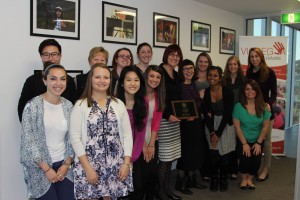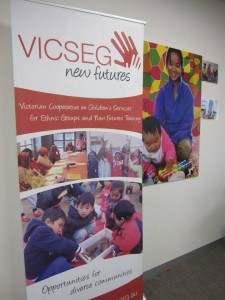 Coming here, it seemed as if all of us pretty much thought Australia was going to be a “white” country. Just walking though the airport, we quickly learned that this country was very diverse. As we spoke to earlier in our first blog post, the city is very rich in different cultures and ethnicities. Walking down the street one may see an Aboriginal, or someone from India, Vietnam, or perhaps someone from the Middle East. Many of our agencies have repeated, “More than 50% of the Australian population has at least one parent who was born overseas.” With this in mind, the work that VICSEG is doing is so absolutely critical.
Coming here, it seemed as if all of us pretty much thought Australia was going to be a “white” country. Just walking though the airport, we quickly learned that this country was very diverse. As we spoke to earlier in our first blog post, the city is very rich in different cultures and ethnicities. Walking down the street one may see an Aboriginal, or someone from India, Vietnam, or perhaps someone from the Middle East. Many of our agencies have repeated, “More than 50% of the Australian population has at least one parent who was born overseas.” With this in mind, the work that VICSEG is doing is so absolutely critical.
 At VICSEG, they recognize the struggles and the hardships that refugees and immigrants face when coming to a new country. They may struggle with not only the language, but also cultural norms and even simple things such as how to purchase items at the grocery store. In class, many of us have learned of the hardships in theory, but to solidify our understanding VICSEG played us a video following the refugee stories of two families on their way to Australia. One family coming from a dirty refugee camp in Burma was use to not having electricity and struggling for food. The other family was coming from Africa to reunite with their eleven-year-old daughter, Lily, who was separated from them as an infant during war. None of us, including some of the workers, guessed how this video would make us feel inside. Until this point, too, we had not realized how diverse our own group of fourteen was as well- we have two students with Italian heritage, a student with parents from India, one student from Vietnam, a student with a Lebanese father and Parisa’s father is from Iran. The video hit Parisa close to home because it reminded her of her Papa and him moving to the United States alone in the 1970s during the Iranian Revolution. He moved to America without a firm understanding of the language and also experienced several bouts racism. Though we all became very emotional, there was a great silver lining: the families on the screen and our families had all shown enormous amounts of resilience.
At VICSEG, they recognize the struggles and the hardships that refugees and immigrants face when coming to a new country. They may struggle with not only the language, but also cultural norms and even simple things such as how to purchase items at the grocery store. In class, many of us have learned of the hardships in theory, but to solidify our understanding VICSEG played us a video following the refugee stories of two families on their way to Australia. One family coming from a dirty refugee camp in Burma was use to not having electricity and struggling for food. The other family was coming from Africa to reunite with their eleven-year-old daughter, Lily, who was separated from them as an infant during war. None of us, including some of the workers, guessed how this video would make us feel inside. Until this point, too, we had not realized how diverse our own group of fourteen was as well- we have two students with Italian heritage, a student with parents from India, one student from Vietnam, a student with a Lebanese father and Parisa’s father is from Iran. The video hit Parisa close to home because it reminded her of her Papa and him moving to the United States alone in the 1970s during the Iranian Revolution. He moved to America without a firm understanding of the language and also experienced several bouts racism. Though we all became very emotional, there was a great silver lining: the families on the screen and our families had all shown enormous amounts of resilience.
VICSEG is an organization whose work is ninety percent focused on training. They offer English as a second language courses in a variety of languages since many of their demographic come to Australia with no formal language training, if any. Additionally, they offer playgroups that bring mother and child together to learn English by singing songs in both languages. Another great program is their mentoring program, which utilizes established immigrants to teach newly arrived refugees how to do basic things such as using an ATM. As a whole, VICSEG does an amazing job of understanding “culture and its function in human behavior and society, recognizing the strengths that exist in all cultures” just as The National Association of Social Workers Code of Ethics suggests.
Demi and Parisa